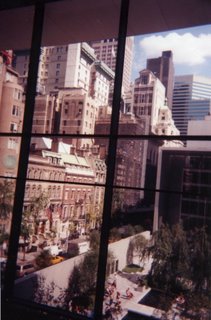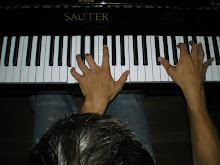 ...Of any "neo" movements in contemporary art. "Tradition" scares me- and, shockingly, i agree with Boulez:
...Of any "neo" movements in contemporary art. "Tradition" scares me- and, shockingly, i agree with Boulez:"No, I do not believe in tradition, I believe in history," he says in a different tone. "The lessons you get from history are your own lessons, you are teaching yourself. Tradition is simply the mannerism of people who came before you. Tradition is passive, history is active." (Sorce!)
- - - - - - - - -
And just so you dont attack me - a word on other "neo"s -
Stravinsky's "Neo-classicism", for the most part, is very much modernist classicism, rather than the other way around. Its re-interpreting ideas rather than style(usually), and when he uses classical mannerisms, its usually quite brief and referential- as if he was beating it into you just what he's up to.
Likewise, Samuel Barber's (or Copland's) "Neo-romanticism" isnt so much looking back to a style, but rather looking to further its range and expressive possibilities. Could one of Barber's earliest and most conventional works, the Overture to the School for Scandal, been produced in the "romantic age" ? Hell no. Its starts off with a sharp bitonality that even Strauss wouldn't have touched.
I have little or no experience with the popular "neo-romantic" pieces written in the last 30 years (aside from those pieces by Glass and Adams that many have sometimes labeled as such) and this may be a good thing. It scares me that contemporary composers could be sinking into something backwards - the gesture seems nihilistic- as if to suggest that all that is artistically viable has been exhausted. What a horribly cynical and close-minded idea!
There are those in the art-history world who will argue that nothing artistic can be truly out of place, that there can be no such thing as an artistic anachronism. Artists are conscious of their times, no doubt, and even if they choose not to reflect that in their art, they're still expressing something. Artistic "anarchronisms" make a statement about the artist and their relationship to their modern world. Likewise, periods of great "anachronism", such as the victorian periods in architecture (which endlessly re-hashed and re-invented medieval architectural language) express a great deal about the society and culture of the times. (the industrial revolution, romanticism, etc).
Pardon my endless quotations around words, but i need to express in some way an idea without suggesting to you that i believe it. Its laziness, you might say, and you'd be correct.
im getting dizzy and tired. Its hard for me to re-read this.
arg.
____________
I was honored by vilain fille's recent post which mentioned this site. She says its "chewey", a good thing i hope, but i can only ask- is my blog chewey? and if so, what does that mean?

1 comment:
I often have a hard time trying to be current as is, even though I am not a composer and more a classical enthusiast. Whenever I attend new music concerts (and I mean very new, the stuff of students and professors) all I see are musical gesticulations and disjointed expressions. It's like watching interpretive dance, lots of movement, no context, easily forgettable.
Sometimes when I do think about writing music, I can't help but do it in an anachronistic fashion, whether it is a Baroque suite, Classical sonata, or a Romantic tone poem. Most of the time, those are the expressions that make the most sense to me. A lot of modern classical I also find resonating such as minimalism and post-Serial expressionists like Rautavaara and Ligeti but I seem less inclined to to write in their language for fear of being derivative. There's the irony, I would rather be derivative of the past than of the present.
If I were to seriously take up composing I know it wouldn't be to make waves in the music world, unfortunately. To me much of the classical world is slowing down. If I wanted inspiration or a gauge to see how current I am, I would look to popular music as the barometer.
And what does it mean to be current also? Does that mean having a lot to do with the time you're in? For an atemporal person like me it's hard to be on top of everything. Maybe I will subconsciously infuse a window to the time into my music, but will it be obvious?
Maybe I'll just stick with wriing tuneful melodies backed up by rock chord progressions - even though it is written for classical instruments.
Post a Comment